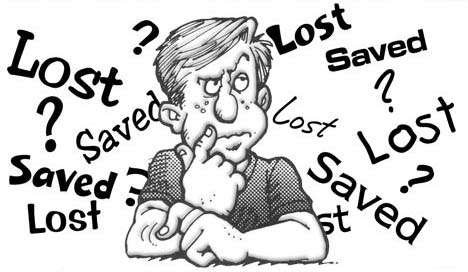
Originally posted in 2015
In the 1960s, the Gerencser family moved to California, the land of promise and a pot of gold at the end of every rainbow. Like many who traveled west, my parents found that life in San Diego was not much different from the life they left in rural northwest Ohio. As in Ohio, my Dad worked sales jobs and drove truck. For the Gerencser family, the pot of gold was empty, and three or so years later we left California and moved back to Bryan, Ohio.
While moving to California and back proved to be a financial disaster for my parents, they did find Jesus at Scott Memorial Baptist Church in San Diego — a Fundamentalist church pastored by Tim LaHaye. Both of my parents made professions of faith at Scott Memorial, as did I when I was five years old. From that point forward, the Gerencser family, no matter where we lived, attended an Independent Fundamentalist Baptist (IFB) church.
Not only were my parents Fundamentalist Baptists, they were also members of the John Birch Society. While in California, my Mom actively campaigned for Barry Goldwater, and later, back in Ohio, she campaigned for George Wallace. Right-wing religious and political beliefs were very much a part of my young life, so it should come as no surprise that I turned out to be a fire-breathing right-wing Republican and a Fundamentalist Baptist preacher.
If the Baptist church taught me anything, it taught me to hate Catholics. According to my Sunday School teachers and pastors, and later my college professors and ministerial colleagues, the Catholic church was the whore of Babylon (Revelation 17), a false church, the church of Satan and the Antichrist. I was taught that Catholics believed in salvation by works and believed many things that weren’t found in the Bible; things such as: purgatory, church magisterium, the Pope is the Vicar of Christ, transubstantiation, infant baptism, confirmation, priests not permitted to marry, praying to statutes, worshiping the dead, and worshiping Mary. These things were never put in any sort of historical context for me, so by the time I left Midwestern Baptist College in 1979, I was a certified hater of all things Catholic.
In 1991, something happened that caused me to reassess my view of Catholics. My dogma ran head-on into a Catholic that didn’t fit my narrow, bigoted beliefs. In 1989, our fourth child and first daughter was born. We named her Bethany. Our family doctor was William Fiorini. He operated the Somerset Medical Clinic in Somerset, Ohio, the same town where I pastored an IFB church. Dr. Fiorini was a devout Catholic, a post-Vatican II Catholic who had been greatly influenced by the charismatic revival that swept through the Catholic church in the 1970s and 1980s. He was a kind and compassionate man. He knew our family didn’t have insurance or much money, and more than a few times the treatment slip turned in after a visit said N/C (no charge).
Bethany seemed quite normal at first. It wasn’t until she was sixteen months old that we began to see things that worried us. Her development was slow and she couldn’t walk. One evening, we drove over to Charity Baptist Church in Beavercreek, Ohio to attend a Bible conference. The woman watching the nursery asked us about Bethany having Down syndrome. Down syndrome? Our little girl wasn’t retarded. How dare this woman even suggest there was something wrong with our daughter.
Bethany continued to struggle, reaching development stages months after infants and toddlers typically do. Finally, we went to see Dr. Fiorini. He suggested that we have Bethany genetically tested. We took her to Ohio State University Hospital for the test, and a few weeks later, just days before Bethany’s second birthday and the birth of our daughter Laura, we received a phone call from Dr. Fiorini. He told us the test results were back and he wanted to talk to us about them. He told us to come to his office after he finished seeing patients for the day and he would sit down and talk with us about the test results.
The test showed that Bethany had Down syndrome. Her Down syndrome features were so mild that the obstetrician missed the signs when she was born. Here we were two years later finding out that our oldest daughter had a serious developmental disability. Our Catholic doctor, a man I thought was a member of the church Satan built and headed for Hell, sat down with us, and with great love and compassion shared the test results. He told us that many miscarriages are fetuses with Down syndrome, and that it was evident that God wanted to bless us with a special child like Bethany. He answered every question and treated us as he would a member of his own family.
This Catholic didn’t fit my narrow, bigoted picture of what a Catholic was. Here was a man who loved people, who came to an area that had one of the highest poverty and unemployment rates in Ohio, and started a one-doctor practice. (He later added a Nurse practitioner, a nun who treated us when we couldn’t get in to see the doctor.) He worked selflessly to help everyone he could. On more than one occasion, I would pass him on the highway as his wife shuttled him from Zanesville to Lancaster — the locations of the nearest hospitals. Often, he was slumped over and asleep in the passenger’s seat. He was the kind of doctor who gave me his home phone number and said to call him if I ever needed his help. He told us there was no need to take our kids to the emergency room for stitches or broken bones. He would gladly stitch them up, even if we didn’t have an appointment.
Dr. Fiorini wasn’t perfect. One time, he almost killed me. He regularly treated me for throat infections, ear infections, and the like. Preaching as often as I did, I abused my voice box and throat. I also have enlarged adenoids and tonsils, and I breathe mostly through my mouth. As a result, I battled throat and voice problems my entire preaching career. One day, I came to see Dr. Fiorini for yet a-n-o-t-h-e-r throat infection. He prescribed an antibiotic and told me to take it easy. He knew, like himself, I was a workaholic and would likely ignore his take-it-easy advice. Take the drug, wait a few weeks, and just like always I would be good as new. However, this time it didn’t work. Over two months, as I got sicker and sicker, he tried different treatments. Finally, he did some additional testing and found out I had mononucleosis; the kissing disease for teens, a deadly disease for a thirty-four-year-old man. Two days later, I was in the hospital with a 104-degree fever, a swollen spleen and liver, and an immune system on the verge of collapse.
An internist came in to talk with my wife and me. He told us that if my immune system didn’t pick up and fight there was nothing he could do. Fortunately, my body fought back and I am here to write about it. My bout with mononucleosis dramatically altered my immune system, making me susceptible to bacterial and viral infections. A strange result of the mononucleosis was that my normal body temperature dropped from 98.6 to 97.0. I lost 50 pounds and was unable to preach for several months.
Once I was back on my feet, Dr. Fiorini apologized to me for missing the mononucleosis. I was shocked by his admission. He showed me true humility by admitting his mistake. I wish I could say that I immediately stopped hating Catholics and condemning them to Hell, but it would be several years before I finally came to the place where I embraced everyone who called themselves a Christian. In the late 1990s, while pastoring Our Father’s House in West Unity, Ohio, I embraced what is commonly called the social gospel. Doctrine no longer mattered to me. Moving from a text-oriented belief system, I began to focus on good works. Tell me how you live. Better yet, show me; and in the showing, a Catholic doctor taught me what it really meant to be a Christian.
Bruce Gerencser, 66, lives in rural Northwest Ohio with his wife of 45 years. He and his wife have six grown children and thirteen grandchildren. Bruce pastored Evangelical churches for twenty-five years in Ohio, Texas, and Michigan. Bruce left the ministry in 2005, and in 2008 he left Christianity. Bruce is now a humanist and an atheist.
Connect with me on social media:
Your comments are welcome and appreciated. All first-time comments are moderated. Please read the commenting rules before commenting.
You can email Bruce via the Contact Form.


